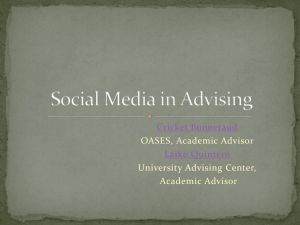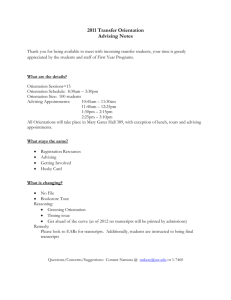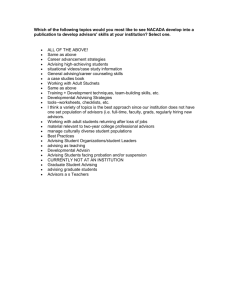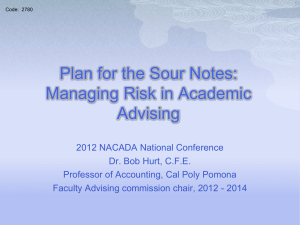Advising Syllabus - Sites at La Verne
advertisement
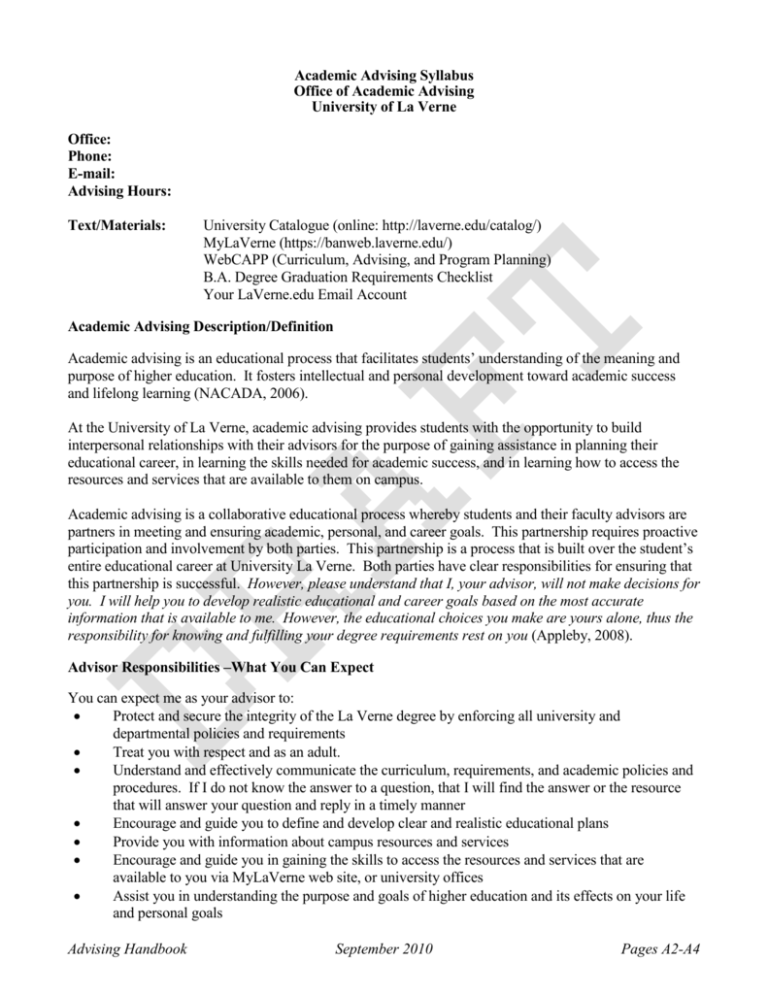
Academic Advising Syllabus Office of Academic Advising University of La Verne Office: Phone: E-mail: Advising Hours: Text/Materials: University Catalogue (online: http://laverne.edu/catalog/) MyLaVerne (https://banweb.laverne.edu/) WebCAPP (Curriculum, Advising, and Program Planning) B.A. Degree Graduation Requirements Checklist Your LaVerne.edu Email Account Academic Advising Description/Definition Academic advising is an educational process that facilitates students’ understanding of the meaning and purpose of higher education. It fosters intellectual and personal development toward academic success and lifelong learning (NACADA, 2006). At the University of La Verne, academic advising provides students with the opportunity to build interpersonal relationships with their advisors for the purpose of gaining assistance in planning their educational career, in learning the skills needed for academic success, and in learning how to access the resources and services that are available to them on campus. Academic advising is a collaborative educational process whereby students and their faculty advisors are partners in meeting and ensuring academic, personal, and career goals. This partnership requires proactive participation and involvement by both parties. This partnership is a process that is built over the student’s entire educational career at University La Verne. Both parties have clear responsibilities for ensuring that this partnership is successful. However, please understand that I, your advisor, will not make decisions for you. I will help you to develop realistic educational and career goals based on the most accurate information that is available to me. However, the educational choices you make are yours alone, thus the responsibility for knowing and fulfilling your degree requirements rest on you (Appleby, 2008). Advisor Responsibilities –What You Can Expect You can expect me as your advisor to: Protect and secure the integrity of the La Verne degree by enforcing all university and departmental policies and requirements Treat you with respect and as an adult. Understand and effectively communicate the curriculum, requirements, and academic policies and procedures. If I do not know the answer to a question, that I will find the answer or the resource that will answer your question and reply in a timely manner Encourage and guide you to define and develop clear and realistic educational plans Provide you with information about campus resources and services Encourage and guide you in gaining the skills to access the resources and services that are available to you via MyLaVerne web site, or university offices Assist you in understanding the purpose and goals of higher education and its effects on your life and personal goals Advising Handbook September 2010 Pages A2-A4 Monitor and accurately document your progress toward meeting your educational goals Be accessible for meetings during office hours, by appointment, telephone, or email Assist you in gaining decision-making skills and in assuming responsibility for your educational plans and decisions Maintain confidentiality (will not discuss issues with parents or non-university persons without your written permission; will respond to academic questions only via ulv.edu email accounts) Assist you in working with, and developing relationships with faculty and instructors As an advisee, you have clear responsibilities in this partnership in order to be successful: Schedule regular appointments or make regular contacts with your advisor during each semester Come prepared to each appointment or walk-in with questions or materials for discussion Be an active learner by participating fully in the advising experience Ask questions if you do not understand an issue or have a specific concern Refrain from asking for academic advise from friends, classmates, or parents Keep a personal record of your progress toward YOUR academic goals Organize documents in a way that enables you to access them when needed Be proactive in checking often the electronic resources via MyLaVerne to keep track of your academic progress Become knowledgeable about degree programs and requirements, policies, and procedures Complete all assignments or recommendations from your faculty advisor Gather all relevant information before making decisions that affect your educational goals Clarify personal values and goals and provide your faculty advisor with accurate and truthful information regarding your interests and abilities ACCEPT RESPONSIBILITY FOR YOUR DECISIONS AND YOUR ACTIONS (or INACTIONS) that affect your educational progress and goals Expected Student Learning Outcomes for the Academic Advising Experience Through the advising experience at University of La Verne, You will demonstrate the ability to make effective decisions concerning your degree and career goals You will develop an educational plan for successfully achieving your goals and select courses each semester to progress toward fulfilling your goals You will demonstrate an understanding of University of La Verne’s central values as expressed in its Mission Statement, its general education requirements, and your chosen course of study. You will utilize the resources and services on campus to assist you in achieving your academic, personal, and career goals. You will make use of referrals to campus resources as needed. You will be able to accurately read and effectively utilize a degree audit through the use of WebCAPP reports and MyLaVerne resources. You will graduate in a timely manner based on your educational plans. Demonstrating Your Achievement of Learning Outcomes In order to accurately measure and document that you have achieved the learning outcomes of your advising, you and the faculty advisor will develop and on-going file of your advising work. This file will consist of a variety of documents including your basic contact information, your CAPP reports, Advising Handbook September 2010 Pages A2-A4 copies of emails, and a variety of documents that you and the advisor will develop together to demonstrate your academic goals. Citations Appleby, D. (2008). In Gordon, V.N., Habley, W.R., Grites, T.J. (Eds). Academic Advising: A Comprehensive Handbook, 2nd ed.. Advising as Teaching and Learning, pp. 85-102. San Francisco: Jossey-Bass. National Academic Advising Association. (2006). NACADA concept of academic advising. Retrieved September 21, 2007) from http://www.nacada.ksu.edu/Clearinghouse/AdvisingIssues/ConceptAdvising.htm Adapted from “Sample Academic Advising Syllabus,” by Charlie Nutt, Kansas State University, NACADA 2005 Conference, Sarasota, FL. Advising Handbook September 2010 Pages A2-A4

